On March 31st 2012 a has-been political wannabe by the name of Alan Wilkinson managed to persuade Kiwi social commentator Dr Brian Edwards to run a short opinion piece he had penned entitled “Missing in Action: The Wisdom of The Crowds in New Zealand” on his blog of the same name. Wilkinson opined:
Are New Zealanders well served by our mainstream print media websites? The two major ones are APN News & Media’s NZ Herald and Fairfax Media’s Stuff.
As the Internet brings the world to our screens at the click of a mouse, we have access to worldwide news from any international source we choose. So it is inevitable that the role of local media websites is changing from the print versions. Rather than try to compete with the major international news gatherers or simply relay world news from them, our local media have to add value by selecting items of particular interest and relevance to New Zealand. A cursory scan of the world news on either the Herald or Stuff websites shows the impact of this localisation and loss of general coverage in favour of human interest trivia with a scattering of regional and NZ interest stories.
At the national and local level, the coverage is much more detailed, competitive and complete. The Herald website is more directly accessible, while most of Stuff’s coverage is buried deeper in regional or sectional web pages. Obviously print journalism everywhere is under financial pressure as readers switch to online sources rather than buying paper versions, and as advertisers follow suit. Furthermore, the Internet provides direct access to the best expertise on specialist subjects. General journalists cannot hope to compete at that level, nor can their newspapers generally afford such expertise. In consequence, where local news stories require specialist input or insight our media are generally limited to what can be obtained readily and for free. So it is patchy in both coverage and quality.
These are forces largely beyond our control. However, there is a very important aspect in which both newspaper websites are falling far short of best practice and therefore failing to serve New Zealanders well. The essence of the Internet is that it is interactive and allows two-way communication in real time. Both the Herald andStuff websites are extremely primitive, even stone-age, in accommodating and exploiting this.
The Herald allows comments on most opinion pieces but almost no news stories. Stuff allows comments on a limited number of news stories and most opinion pieces. On both websites all comments are held for moderation, sometimes delayed for hours or even days.. The Herald heavily culls comments, usually cutting them off completely after a short time. In both papers moderation is extremely inconsistent varying greatly from one area to another and according to the day of the week.
Contrast for example the UK newspaper websites where, despite hate speech, official secrets and defamation legislation at least as restricting as in New Zealand, comments are generally published immediately, subject only to automated vetting and a “report complaint” process. As a result, errors in articles and reports are challenged immediately and views are directly debated bringing out new insights and relevant information. In the Herald, particularly, the moderation delay results in a whole sequence of comments repeating essentially the same things, often from two different political extremes – tediously uninformative and unproductive.
It is high time these websites sought to exploit the wisdom of crowds rather than hiding behind the legal fig-leaf with which they defend their stone-age moderation systems. That can only happen when real-time, interactive commentary is enabled instead of being knee-capped.
Source: http://brianedwardsmedia.co.nz/2012/03/missing-in-action-the-wisdom-of-crowds-in-new-zealand/
The opinions expressed by Alan Wilkinson’s were of course, as pretty much always, a whisker short of delusional for two very good reasons.

Alan Wilkinson, one of New Zealand’s more deluded on-line political blog commenters, a man that likes to get down and very dirty, attacking anyone who might disagree with his own personal schema or for that matter his amazing intellect.
The first and most obvious can be found in the now infamous case of Christchurch crèche worker, Peter Ellis, who was prosecuted in a sham trial, then hung out to dry, in what is now recognized internationally as being little more than a witch-hunt, conducted by corrupt politicians and bent police officers.
In fact it remains one of New Zealand’s most egregious injustice’s, despite all the obvious holes in both the prosecution and appeal failures, an injustice which has yet to be corrected.
Importantly its also an injustice that Wilkinson’s “Crowd Wisdom” originally played a significant part in creating and, again importantly, that same crowd wisdom has done absolutely nothing of significance to correct the injustice, baring of course a handful of dedicated campaigners, most now more than happy to sit back and forget it ever happened.
Whilst Wilkinson seems to believe that the online antics of a few is capable of changing history we would argue that politicians, in fact the authorities in general don’t often react to cyber rants. In fact we would argue that the last time the wisdom of the crowd was used to great effect was in the 2001 case of Mark Middleton’s prosecution by police and the almost immediate police about face and Middleton’s release from prison following a public outcry and protest march.
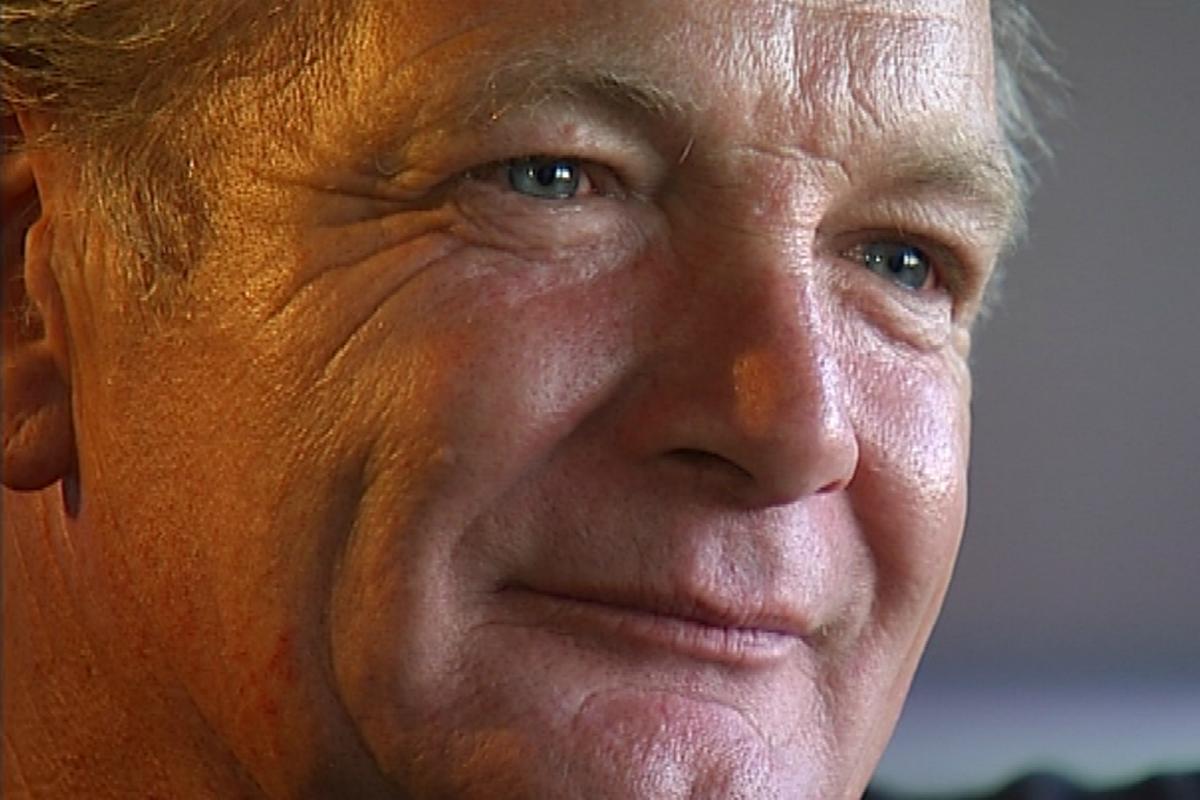
Mark Middleton’s release from prison was not achieved by Chardonnay guzzling fat arsed cunts the like’s of Alan Wilkinson or his “Crowd Wisdom”. It was the result of just two concerned campaigners who spoke up against the police and encouraged thousands of people to get up off their couches and march through city centres all over New Zealand.
In Mark Middleton’s case it was not a cyber campaign that generated the result but rather a huge ground swell of public opinion that was then converted into one of the largest national protests on an issue of justice in decades, complete with the all important street marches in Auckland, Wellington and Christchurch, and many of New Zealand’s smaller regional centre’s.
In fact the history of online activity in the area of justice has seen little if any success, the most notable website, originally dedicated to protesting the Ellis case is now little more than an online resource, albeit an exceptionally good one.
In the area of justice New Zealanders for some reason seem to be more motivated by nastiness, as was seen with the popping up of a website established to attack the result in the second trial involving the Bain murder case.
Of course, ultimately that site operated by Kent Parker and Victor Purkiss was pulled down and David Bain’s champion, Joe Karam compensated for the vitriol and bile he, his family and Bain had endured.
Of course the site was more politically motivated, its agenda to support a government move to thwart compensation and thus dealt not in the facts or the many police abuses during the investigation and first trial, but instead a twisted cocktail of misinformation, opinions and outright hatred, all to ensure that Bain did not receive compensation for the decade he had spent behind bars.
Only recently have three new website’s emerged that deal with injustice in the wider sense and in a more proactive manner, www.nzjusticeforum.org www.nzpca.org and of course laudafinem.com. Interestingly none of these website have garnered any mainstream media attention. This is of course only to be expected from an MSM that has largely been complicit in police corruption, mainly by omission, or ignoring the existence of injustice, but on occasion actively participating in covering up police wrongdoing and out right corruption.

Another New Zealand victim of Alan Wilkinson’s “Crowd Wisdom”, Peter Ellis. Ellis was falsely accused and wrongly convicted in 1993 in the now infamous Christchurch Civic Creche Case, a prosecution contrived by bent politicians and police. There was a good reason why author Lynley Hood named her book “A City Possessed”
The second reason to ignore Wilkinson’s delusion is to be found, some three years after his opinion piece was published, in the online behaviour of the author himself in the here and now.
We will return to Wilkinson’s attitudes and online transgressions soon enough, but first we want to take a look at two events, the first, the more contemporary of the two, being Nicky Hager’s book “Dirty Politics”. The second, a 20 year old court case; The Gisborne Herald Limited v The Attorney General.
Now all three of these seemingly unrelated events do have a connection, a nexus so to speak. Their commonality is to be found in the behind the scenes behaviour of New Zealand’s police force, the very same Organization responsible for the investigation and false prosecution of so many innocent Kiwi’s, men like Peter Ellis and David Bain, citizens who have not seen real justice, despite years of concerted efforts to right the wrongs New Zealand’s justice system has inflicted.
In his book Nicky Hager purports to expose what he euphemistically terms “Dirty Politics”.

Kiwi author Nicky Hager deliberately concealed the identities of some of New Zealand most corrupt mainstream media journalists, in all likelihood with full knowledge that many of his “friends” may well have faced criminal prosecution had he included them and the evidence in his book Dirty Politics.
The information that Hager used in researching his book was obtained from files, documents and emails, that were stolen from Kiwi Blogger Cameron Slater, his computer and online accounts, in early 2014.
Slater must have collected this material over a period spanning seven years or more, at least back to 2007 when he had first entered the world of political blogging, thus there must have been considerably more evidence than that which was touched on by Hager.
Now there are a couple of things that have happened since Hager’s book was launched. The first is of course the various interviews Hager has given, most immediately following the book launch. Of interest are the claims that Hager himself made around the identity of the self-titled hacker we all now know as Rawshark.
Hager’s various descriptions of the hacker and the explanations he offered, as proxy a voice, for the hackers behavior simply don’t add up, no matter how you evaluate them; a fact that has recently been picked up on by Cameron Slater’s partner; a fact that we here at LF had also noted some months ago.
What additionally does not add up is Hager’s extremely strange decision to leave the behavior of, what seemed to us to have been a large number of corrupt journalists, out of his book. Hager’s pitiful excuse being that he wanted to give these men and woman the opportunity to “redeem” themselves.
Now quite what that means and how Hager envisaged this “redemption” unfolding, moreover Hager’s ability to ensure that these clearly corrupt journalist’s did in fact start to “redeem” themselves, has been conveniently and very carefully avoided by the author in his so called political expose.
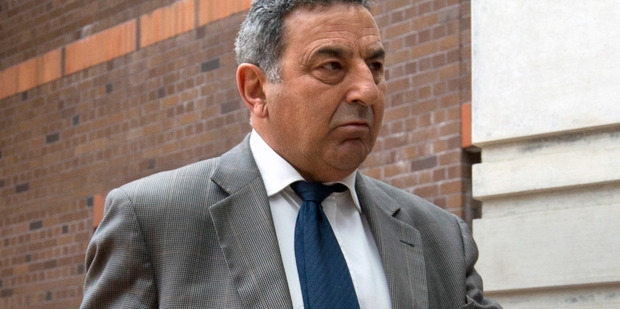
New Zealand Justice Campaigner Joe Karam, another victim of Alan Wilkinson’s “Crowd Wisdom”, as High Court Justice Courtney noted at the completion of Karam’s defamation tort against another two crowd wisdom specialists, Kent Parker and Victer Purkiss, “Few aspects of Mr Karam’s reputation were left untouched.”
In fact it is a question that we suspect has never been asked of Hager, at least not in so many words and certainly not by New Zealands mainstream media.
This then brings us to the contents of the files that Hager had been given, it also, perhaps more importantly raises the issue of what it was that Hager was not given, or whether Hager has lied about this issue, in that he had in fact been given access to the entire cache Rawshark had stolen.
There are a number of things that are self-evident; at least they will have been to any thinking person.
Cameron Slater by all accounts was particularly well connected. Whether they were politicians, civil servants, backroom political power-brokers, senior police officers, their journalist spin-doctors, slater seemed to have had access to a wide variety of powerful people. In short there were very few doors that appeared to have remained closed to the blogger under the national party lead government in the period 2007 – 2014.
This then brings us to the content of Nicky Hager’s book, which in all honesty was a rather dull affair, with very few if any surprises for anyone who is an astute consumer of political content and of course grounded in the real world.
Slater was primarily a political blogger, who rose to prominence on the back of a somewhat successful government and his own political connections. However by 2010 Slater’s influence had grown well beyond just bread and butter politics, as had his contact list, which obviously included the aforementioned journalists that Nicky Hager has sought to protect.
Of course there is another dimension to Hager’s protection of these individuals, the fact that Slater, in his defence, has actually decided to not deliver an axe blow, or much in the way of dirt, on these same journalists is telling.
Now that is not to say that dirt does not exist, for if it didn’t then Nicky Hager would not have sought to protect the journalists in the first place, and then endeavoured to explain away the behavior and his bullshit decision to give them all the chance to redeem themselves.
What it does say however, is that in amongst the dirt that Slater has, the same dirt that is likely evidenced in the documents Hager was handed, there is likely to be particularly dangerous material; dangerous for the journalists at least. Mores the point, the journalists behavior was in all probability criminal in nature, a fact recognised not only by Hager himself, with his silence, but seemingly, on this occasion at least, with Slater’s own quite uncharacteristic silence as well.
Now we here at LF, and the more astute observer, also know that Hager’s book was at best somewhat disingenuous, or perhaps worse, a complete sham, in that it revealed little and appears at some level to have been more of a cover-up, a fraud that focused not on the genuine problems with New Zealand’s media, problems that Hager has now been complicit in continuing to conceal, but on Cameron Slater’s behavior, and that of his inside political contacts alone.
There is absolutely no doubt that the New Zealand Police force are also aware of this reality, and put simply, have themselves now used Slater’s belated police complaint to legitimise their own blatant breach’s of accepted legal protocols that surround journalists and the various legal privileges they and their sources are entitled to, whilst raiding Hager’s home and seizing absolutely everything that was not nailed down; including electronic devices that ostensibly belonged to Hager’s children.
The police of course aware, assuming that Rawshark had managed to make off with everything, that amongst that material there would have likely been emails and correspondence that implicated senior police officers, thus compromising the New Zealand police themselves.
This is where we now depart the Hager book, the events surrounding it and take readers back to the period 1993 – 1995, a very different era in the New Zealand police force’s history.

Corrupt New Zealand police sycophant and all round nasty piece of work, Michael Muir; publisher of the Gisborne Herald at the time the publication was taken to task over its support for police corruption and endeavours to pollute the local jury pool
This was the era of extraordinarily blatant police corruption and coverup. A constabulary that dealt in smear, spin and innuendo, and worse; if need be the suborning of perjury and jurors in their efforts to cover up police offending such as in the Louise Nichols case, or obtain wrongful convictions, especially where the police’s evidence was at best questionable.
These practices came to an abrupt halt after two specific cases, one of course being the aforementioned Louise Nicholls case, the other, when highly prejudicial police pre trial practices were revealed and challenged by defence council in a separate criminal matter. That case is of course now well known, even in the international legal sphere.
The Gisborne Herald Co Ltd v Solicitor-General [1995] 3 NZLR 563, 569 CA. precedent brought to a halt the New Zealand polices clandestine practice of smearing defendants, the dissemination of prejudicial material via the press, ensuring that New Zealand media outlets were, often secretly, handed completely unrelated material that would ensure police obtained the conviction they sought; but not however on the merits of the police investigation or the often unlawfully obtained or planted evidence in many cases.
Of course the police were forced by that particular court decision to ban all communication with the media prior to trial. No longer could police officers discuss matters with journalists, particularly off the record, other than material that was officially permitted by the police media liaison office or the Commissioner himself.
Of course this has remained the police’s official line, at least with the mainstream media; until that is, the more recent evolution of political blogs in New Zealand.
With the rise of the internet age and more particularly bloggers and online forums New Zealand’s police officers ripped up the rulebook, at least the bent officers in the ranks did.
In fact, the police force as an institution was among the first and only police force’s in the western world to jump at the opportunity to covertly utilise these new technologies in the renewal and furtherance of their age old corrupt practices, in particular that of disseminating prejudicial misinformation pretrial and polluting jury pools.

Mr Pudgy, NZ Labour party nut-job and half-arsed conveyancing lawyer Greg Presland, another of the loons from the political left that have suddenly found themselves attracted to Pete Georges blog, like blue arsed blowflies to a large dog turd
Of course with bloggers the police also had the same advantages that anonymous commenters have, such as being able to conduct their often-malicious campaigns in a cloaked fashion.
New Zealand’s citizenry, somewhat amusingly, still believe that they, unlike other parts of the free world, have retained free speech. The truth however is a somewhat different reality, the country’s police force having developed very close working relationships with US corporate giants the likes of YouTube, Facebook and Google, clandestine relationships that exist behind the thin veneer of New Zealand’s troubled democracy. In reality the New Zealand police access private information, which would, in any other modern democratic jurisdiction, only be available once warrants had been sought and granted by a Court of law.
It is these corrupt practices, that New Zealand’s police once shared only with the country’s very closed media circles, that have now been extended well beyond the MSM and now encompass, among other things, blogs and the administrators behind a number of more prominent websites.
Often the bloggers themselves may be oblivious to the fact that agents masquerading as informants or whistle-blowers circulate material on behalf of police, or individual officers with corrupt agenda’s. This was perhaps best demonstrated during the 2008 prosecution of Fairfax where the judges questioned the police failure to lay charges despite suppression orders surrounding the “Tuhoe Terror Files”. Again the New Zealand police had likely been behind that particular Fairfax breach, police at the time keen to obtain public support for a seriously dodgy police investigation and prosecution which ultimately failed.
A more recent case is to be found with the Auckland High Court registrar who returned home to the Philippines on holiday only to almost immediately pen a piece for a Filipino magazine, breaching suppression orders in the Blessie Gotingco case. Importantly the publication was one that also had a large online presence and following.
Why in god’s name would a registrar do this? – Murl (redditt/nz)
Whilst the matter was very briefly reported in the New Zealand media, there was little in the way of resources dedicated when it came to investigating or prosecuting this New Zealand Court official. In fact he was not even named by the mainstream media.
Certainly the so-called high court registry official was not charged upon his return to New Zealand, nor did the country’s police friendly newspapers bother to chase the matter to what, if you are to believe the police in other cases, should have been an inevitable result, a plausible explanation and or the prosecution and termination of this registrars employment with the New Zealand Department of Justice.
There is therefore little, if any, doubt that the registrar had acted with the blessing of New Zealand’s police force. Of course the question needs to be asked, why did New Zealand police purportedly then charge a woman, an Australian resident, in almost identical circumstances, except of course, for the fact that she was not a High Court Registrar?
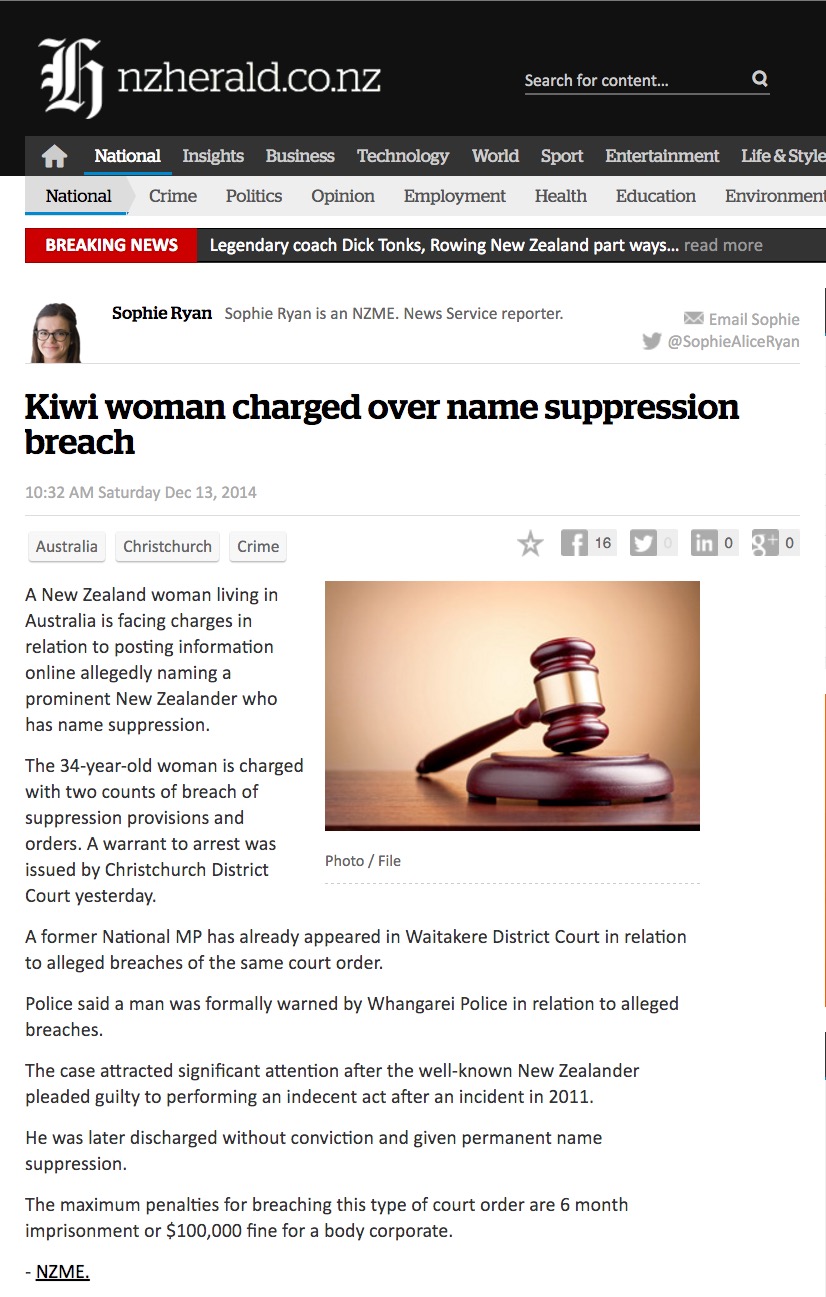
Are the New Zealand police running a two tier prosecution system? If you breach suppression orders on police instructions its okay?
The fact is that the New Zealand police were almost certainly behind the suppression breach in the Blessie Gotingco case, at least in so far as they had more than likely given the registrar the green light, their blessing so to speak, a fact which has of course been completely ignored by New Zealand’s duplicitous mainstream media, again under the instruction of NPHQ.
This behavior is still occurring at court registry level throughout New Zealand; with court officials flouting blanket suppression orders almost daily; by regularly, almost always unlawfully, providing MSM journalists with detailed information, even photocopies of court files that have been sealed by order of the Court.
These same registrars are also obviously prepared later to risk destroying court records and any other material that might evidence their criminal offending to protect police, journalists and themselves from prosecution. All of this is of course done with the tacit, often blatant, approval of the New Zealand police.
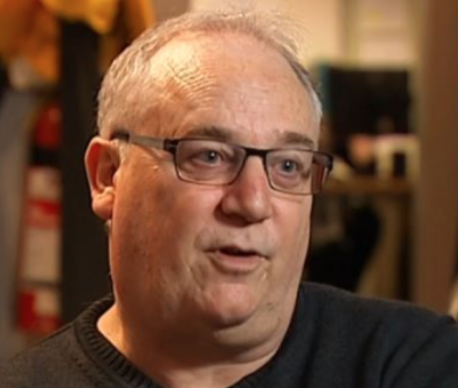
Eddy the expert and all round bullshit artist, Lynn Prentice, a man that hated Pete George with a passion, then suddenly attracted to Pete Georges “Free Speech” campaign…..Call us sceptics but we here at LF suspect there is more to the pairs very recent love affair than free speech.
This then brings us again to the aforementioned New Zealand political blogs, journalists and Nicky Hager’s book Dirty Politics.
Hager had to have been aware that had he named and exposed the extent of the journalists offending, the allegedly unscrupulous dealings with Cameron Slater and many other political bloggers, then those same journalists would now likely be facing criminal prosecution; with a possible term of imprisonment once their corrupt dealings with the New Zealand police were exposed.
This is of course undoubtedly the reason behind the way in which the New Zealand police raided Hager’s home; in search of any information or intelligence that would indicate to them the extent of Hager’s knowledge.
The Gisborne Herald Limited v NZ Attorney General did little to stop the New Zealand police and it’s more corrupt officers perverting justice in the long term.
Police have simply changed their M/O; the way they interact with the new media. With the advent of blogger’s MSM journalists no longer have a monopoly on access to corrupt cops.
Evidence of this police abuse is to be found in the number of more recent name suppression breaches that have not resulted in police prosecutions, breaches committed by bloggers such as Martin Bradbury, Lynn Prentice and Pete George. All of whom, with out doubt, have become an integral part in a reinvigorated corrupt police network, along with Kiwi MSM journalists such as Robb Kidd.
This then brings us back to Alan Wilkinson’s article (above). As one of the commenters on Wilkinson’s article opined;
For “wisdom of crowds” substitute the stupidity of the herd. The concept may work well when guessing the number of jelly beans in a jar but I am skeptical that such wisdom translates to anything of importance……..
………Unfortunately history shows that the crowds get it spectacularly wrong at times; Nazi Germany, Stalinist Soviet Union as two examples. Every time there is a stock market crash we see the herd mentality at work. I suspect it was the herd mentality, rather than any collective wisdom that earned National close to 50% of the vote at the last election.
You may respect the wisdom of crowds, Alan, but crowd mentality makes me distinctly nervous.
Of course the commenter Ben is 100% right. What’s more Alan Wilkinson has only recently proven Ben right yet again, with comments that Wilkinson himself has made on various posts published by kiwi blogger Pete George. Theses posts and the comments in themselves do in fact constitute serious criminal offending; namely the aforementioned contempt of court.
Alan Wilkinson is of course not the only guilty party in this regard, other than Pete George the blogs owner, there have been various other well known cyber trolls and political shit-stirrers, some of whom, like Wilkinson, are known to have associations with corrupt police officers, who have also committed or reinforced Pete George’s and or Wilkinson’s criminal offending
Alan Wilkinson’s pet “Crowd Wisdom” cause might be harmless enough were it to be limited to political discourse alone, but the problem is that commenters like Wilkinson never do. Wilkinson, himself a bully, is one of the worse offenders when it comes to this sort of criminal abuse of the judicial process.
In fact the thing that stands out with Wilkinson’s online campaigning and perhaps more importantly his criticisms of the media and various blogs is the fact that Wilkinson himself is clearly reluctant to put his money where his mouth is.
Alan Wilkinson despite his attempts to proselytise the masses, using free speech as an excuse for his invective, has never himself set up or run a blog, despite it being so easily done.
This failure is telling, Wilkinson’s reluctance to risk his own cash in pursuit of what he likes to call “free speech”, but that which the courts more often that not would be likely to view as defamation is evidence of his true agenda.
Wilkinson is basically a show pony, his vapid arguments and online protests little more than his desire to be seen and noticed in the political sphere.
Political blogs in New Zealand have inevitably, albeit regrettably, become involved in issues of justice, many of which cases are subject to sub judice and or suppression orders, and yet they have done so, a least thus far, without any legal consequence whatsoever.
As with the case of the Gisborne Herald back in the 1990’s it was not the New Zealand police who acted to preserve the public confidence in the judicial system.
In fact it was not even the Attorney General that acted in the first instance.

Slater hater, National party spin-doctor, sex tourist and Vietnamese rice diet specialist Hamish Price, another of Pete Georges new found mates who has difficulty distinguishing shit from clay
Rather it was a private prosecutor, the defence in a case where local police and complicit journalist had actively sort to pervert justice by poisoning the town’s small jury pool, using a newspaper with a somewhat notorious history of supporting corrupt police officers and using the practice of publishing highly prejudicial material to benefit the prosecution.
In similar fashion, history is now, we suspect, repeating. It was only ever going to be a matter of time before another private prosecutor sought to yet again preserve justice in the era of the internet; that bloggers would soon enough become subjected to a very similar test, a challenge to their obvious abuse of the law, by way of a criminal prosecution.
This then brings us full circle, back to the matter of Alan Wilkinson, his obvious belligerence and perhaps more particularly the recent comments wilkinson, Pete George, Lynn Prentice and others have made online in posts that are undoubtedly clear unequivocal contempt of court, the Courts authority, directions and orders given completely ignored.
Pete George has himself now pointed to what he called a “private prosecution” that he is apparently now caught up in, although he has clearly employed obfuscation when asked for any specific details, preferring instead to dance around the need to provide his readers with any honest or accurate information, despite readers themselves being put at risk with the bullshit overarching proclamation that it was an issue of “free speech” alone.
Detail is not however required in order to work out that George has in fact likely been charged with criminal offences. By definition “private prosecutions” are always criminal on nature, information’s, or charges, which have likely already passed the courts scrutiny and been issued against the defendant/s.
George and a handful of his followers, including Alan Wilkinson, Russell Beaumont, Hamish Price and Francisca Halligan have as a result set about engaging in what George has euphemistically called the “war of the blogs” which of course is in reality a misnomer for Pete George’s recent attempts to conceal his own criminal offending and his obsession with Lauda Finem and any number of our more obvious New Zealand followers; supporters who may or may not be involved prosecuting Pete George. It seems to us that whilst LF and many of the followers Pete George has named are certainly not responsible for the private prosecution the idiot is now facing, but of course Pete George does not want to see it that way.
For the past four weeks Pete George has sought to obfuscate, smear, defame and ridicule certain LF followers using his blog ably assisted by the same small band of his own hardened nut-job followers who have only recently found themselves attracted to Georges blog content; which includes of course “Crowd Wisdom” lunatic Alan Wilkinson.
The extent of this small groups bad behaviour is quite extraordinary, all three having taken their so-called cyber “war of the blogs” out into the real world, in Pete Georges case his “activism” extending to telephoning LF supporters employers, with the premeditated intention of causing reputational and financial harm, very much the same sort of behaviour that resulted in Parker and Purkiss’s dramatically expensive downfall.
The fact is that Pete George alone is responsible for the predicament he now faces, nothing whatsoever to do with “free Speech”, nor is it a predicament that has anything to do with Lauda Finem any of our followers.

Justice campaigner Joe Karam was awarded $535,000 for the damages inflicted by Alan Wilkinson’s “Crowd Wisdom”, as seen through the eyes of Purkiss, Parker and their fucked up followers.
Another blogger that deserves mention in this particular case, a short, argumentative, ill tempered man who recently rode in on a white mule, purportedly coming to the defense of Pete George and “Free speech”, is in fact also it seems a defendant in that very same criminal prosecution, although this is yet to be confirmed.
Pete George follower’s Alan Wilkinson and Francisca Halligan are also prima facie guilty of the same criminal offending, although it is not yet known if charges will be sought in their cases.
Alan Wilkinson’s “crowd wisdom” is little more than a fallacy, all bullshit and political rhetoric, with little if any evidence to support it, is in fact little more than a vehicle for Wilkinson, and people just like him, to abuse the law.
Wilkinson is not such an unusual character in this respect, in so far as the opinionated arsehole’s one normally finds commenting in online political forums and websites.
One of Wilkinson’s more obvious traits is his over developed sense of self-importance and superiority, a form of selfishness normally only found in sociopaths.
In almost all of the online material LF have come across, published by Wilkinson, including the above post on Brian Edwards blog, Wilkinson is always seen to talk up the notion of free speech and the wisdom of the crowd as if it is somehow self evident. He does so in the face of a large body of overwhelming evidence that contradict his argument.
Among the body of evidence that reduces Wilkinson’s postulations to little more than shit splattered cat litter is the entire body of wisdom that has come from a justice system that is the cumulative result of over one thousand years of turbulent, often violent, history that has resulted in the highly evolved legal framework that governs justice.
Wilkinson however, as with many in New Zealand chose’s to dismiss a vastly superior 1000 year old wisdom of this system, often out of what seems to us to be a perverted sense of Kiwi individualism, and the deluded notion that the essential nature of man has somehow changed since the signing of the Magna Carta.
In fact we would argue that the New Zealand governments decision to abolish the Privy Counsel, replacing this extraordinarily successful institution with a “supreme court” of their own, comprising an extremely small pool of adequately qualified legal practitioners to form a bench of local judges, was born of exactly this same nationalist styled fervour, the extremely deluded and all to convenient belief that they could somehow do it better than those with more experience, and for less; what price justice?
It was of course a decision that is only now just beginning to enter the beginning stages of what may well eventually result in a constitutional disaster.
The fact is that no matter how you look at Wilkinson’s strange faith in humanity, no amount of his so-called “Crowd Wisdom” is ever able to outsmart a corrupt police force that is hell bent on perverting justice, as has been the case with the New Zealand police force for more than 50 years, and the publics failure to recognise and or deal with this systemic corruption.
Police forces are inherently well resourced, funded from the public purse, and more than capable of fooling the average New Zealander, a fact that has been repeatedly proven over the years with an extraordinary volume of questionable police practices, investigations, cover ups, prosecutions and the many innocent victims that have eventually been released from prison, but not before their supporters and advocates had experienced the Machiavellian machinations of the New Zealand police force and their well feed Crown attack dogs.

Kiwi political blogger and all round hypocrite, Martyn Bradbury – What caused his sudden interest in Lauda Finem? Ten months on it certainly was not the photograph of a compromised journo, who’s extremely bad behaviour Bradbury had himself sought to conceal……. Fear that LF had set their sights on him perhaps?
The question is however will the criminal prosecution of Pete George facilitate the wider control of other bloggers, in much the same way the prosecution of the Gisborne Herald placed limits on what mainstream journalists and their media bosses were able to get away with? If not we here at LF predict that many more Kiwi political bloggers will in turn be prosecuted until they finally get the message. Perhaps it’s this reality that prompted Martyn Bradbury to crawl out from under his rock recently, naming LF “Chaotic Evil Blogger of 2015″. Of course we cannot be certain as to why Bradbury decided to attack LF, in a post that was in any event largely focused on Cameron Slater’s alleged transgressions, but if he thinks we really give a fuck then he is in for a shock.
There is however one thing that Bradbury can be certain of, it is the fact that he is number four on the list in LF’s target group of bloggers, having committed a number of criminal offences over the past two years, and suspiciously having successfully avoided a police prosecution.
We here at Lauda Finem will be playing a role in monitoring Kiwi bloggers, so that any contempt of court is then known to Kiwi groups who only recently seem to have shown an interest in prosecuting these violations, particularly where they suspect that New Zealand police officers or Court registrars have been party to the criminal offending, by surreptitiously supplying the information subsequently used by blogs to increase readership.

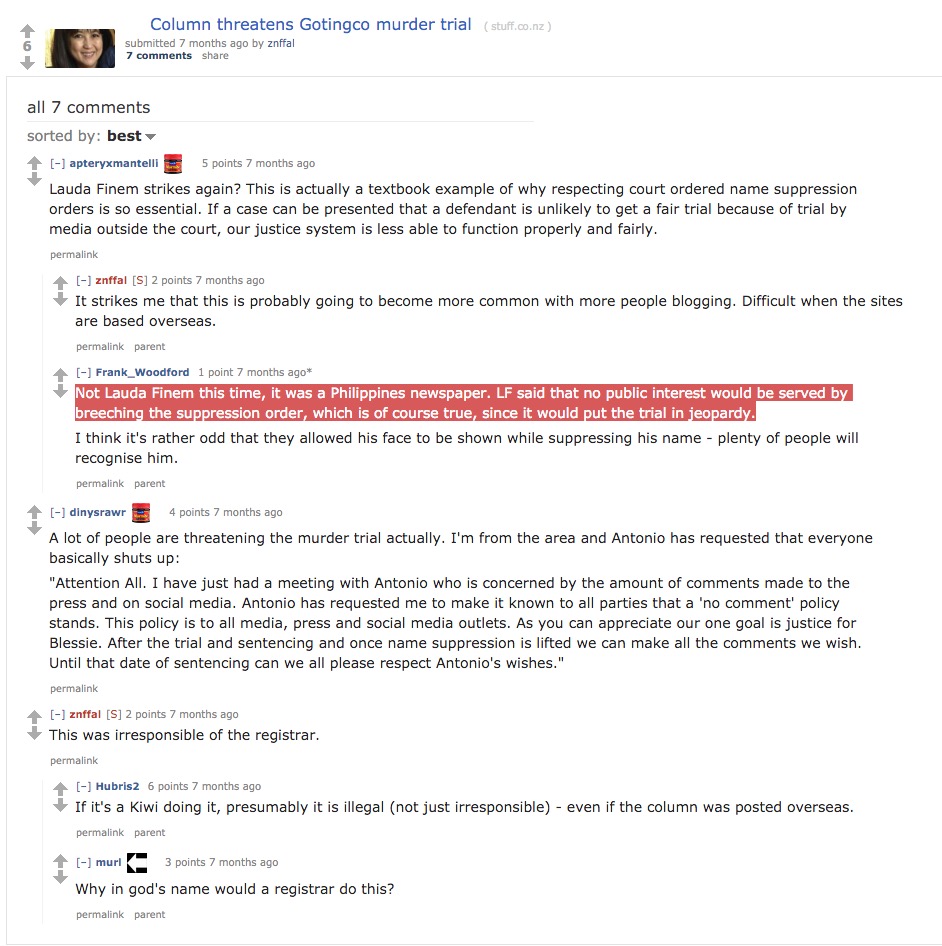
Comments are closed here.